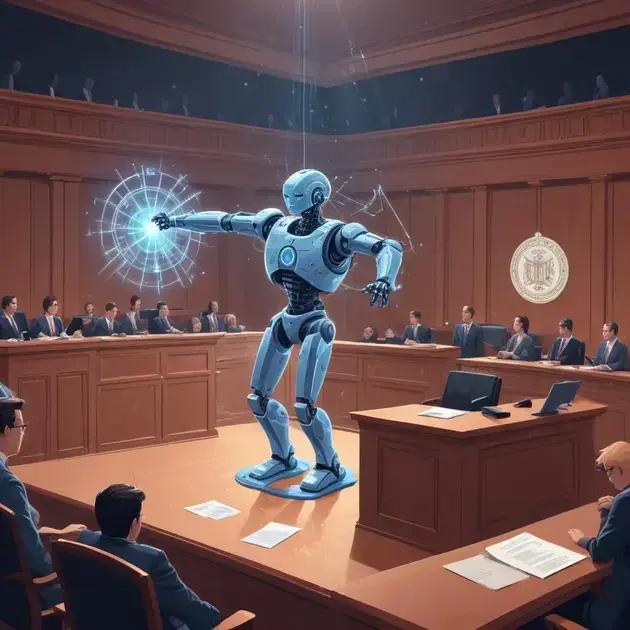In the ongoing battle over copyright and artificial intelligence, OpenAI finds itself at the center of a significant lawsuit brought by the Indian news agency ANI. The case revolves around allegations that OpenAI used ANI’s content without permission to train ChatGPT. With the Delhi High Court scheduled to address these issues soon, the situation unfolds amidst larger conversations about the legal responsibilities of AI companies and the implications for copyright holders.
Introduction to the OpenAI lawsuit
The OpenAI lawsuit involves serious allegations against OpenAI by the Indian news agency ANI. ANI claims that ChatGPT was trained on their copyrighted material without permission. This lawsuit raises important questions about the legal responsibilities of AI companies in using training data.
Background of the Case
The case centers around content created by ANI. The agency argues that their news articles and reports were used by OpenAI without authorization. As AI technology grows and changes rapidly, so do the implications for copyright laws.
Understanding the specific legal frameworks that govern copyright is crucial. In many jurisdictions, copyright holders have rights that protect their original works. This situation can create conflicts with AI training practices, which often involve the use of large datasets.
Legal Obligations of OpenAI
OpenAI, like any other tech company, must adhere to copyright laws. This includes obtaining the necessary permissions to use copyrighted material. The outcome of this lawsuit could set a precedent for how AI developers handle training data in the future.
There is a broader context to this lawsuit. As AI evolves, the lines between public domain and copyrighted material can become blurred. This can lead to legal ambiguities, which necessitate clearer guidelines and regulations.
Legal obligations of OpenAI
OpenAI has specific legal obligations when it comes to using copyrighted content for training its AI systems. These obligations ensure that the rights of content creators are respected. Breaching these rules could lead to significant legal consequences.
Understanding Copyright Laws
Copyright laws protect original works. This includes articles, images, and videos. Any use of these materials typically requires permission from the copyright holder. OpenAI must navigate these laws carefully to avoid infringing on the rights of others.
Obtaining Permissions
To use copyrighted content, OpenAI should:
- Identify the sources of the content.
- Contact copyright holders to request permission.
- Establish agreements that outline how the content will be used.
These steps can help prevent legal issues and promote a fair use of materials in developing AI.
Impact of the Lawsuit
This lawsuit serves as a reminder of the importance of compliance. If OpenAI does not follow copyright protocols, it risks legal battles that could impact its reputation and operations. The results of this case may lead to changes in how AI companies manage training data.
Overall, understanding these legal obligations helps protect both AI developers and copyright holders. This balance is essential for the advancement of AI technologies.
Jurisdictional arguments in the case
The jurisdictional arguments in the OpenAI lawsuit revolve around where the case should be tried. Jurisdiction refers to the official power to make legal decisions. As such, this aspect of the lawsuit is very important.
Understanding Jurisdiction
Jurisdiction can be based on various factors, including:
- The location of the defendant (OpenAI).
- The location where the alleged infringement occurred.
- The laws that apply to copyright and data usage.
These factors will determine whether the case is heard in a specific court or not.
Arguments from ANI
ANI argues that the lawsuit should be heard in India. They point out that they are an Indian company, and the alleged copyright infringement affected them directly. By bringing the case in their home country, they can better protect their rights.
OpenAI’s Counterarguments
On the other hand, OpenAI may argue that the case should be heard in a different jurisdiction. They can claim that:
- The operations of OpenAI extend beyond India.
- Any content usage occurred in multiple locations.
- The legal frameworks governing copyright have particular aspects that favor their position.
This argument emphasizes OpenAI’s global reach and the complex nature of digital content distribution.
Potential Implications
How this jurisdictional debate is resolved could greatly impact the case’s outcome. A ruling in favor of ANI may set a precedent for future copyright lawsuits involving AI. It highlights the challenges companies face as they operate in a globalized digital environment.
Concerns over competition and data usage
The concerns over competition and data usage are critical in the OpenAI lawsuit. As AI technology advances, competition among companies intensifies. This can lead to ethical questions about how data is accessed and utilized.
Impact on Competition
One major concern is how OpenAI’s actions could affect fair competition. If OpenAI is found to have used copyrighted data without permission, it raises questions about how AI companies gather training data. This can create an unfair advantage over smaller entities that adhere to copyright laws.
Fair Use vs. Copyright Infringement
Understanding the difference between fair use and copyright infringement is essential. Fair use allows limited use of copyrighted material without permission, but it is often a gray area. The lawsuit illustrates the challenges in determining what constitutes fair use in AI training. This directly affects how companies approach data usage.
Concerns of Data Privacy
Another concern is regarding data privacy. Consumers and businesses are increasingly aware of how their data is used. If OpenAI is using data without consent, it might violate privacy laws. This fear can damage trust between users and AI companies.
Regulatory Implications
As the case unfolds, it may influence future regulations. If courts lean toward stricter interpretations of copyright and data use, all AI companies may need to change their data collection practices. This could alter how AI technologies are developed and used.
Overall, concerns about competition and data usage are vital discussions stemming from the OpenAI lawsuit. They highlight the need for clarity in law as AI technologies continue to evolve.
Conclusion: Implications for AI and copyright
The implications for AI and copyright are significant as the OpenAI lawsuit proceeds. This case will likely impact how AI companies operate and engage with copyrighted materials.
Impact on AI Development
As the legal landscape surrounding AI evolves, developers may need to adjust their training methods. Compliance with copyright laws will become more critical. This may also lead to increased transparency in how data is sourced for training AI models.
Changes in Copyright Laws
The outcome of this lawsuit could prompt lawmakers to consider new regulations. They may need to create clearer guidelines for the use of copyrighted material in AI training. This will help prevent confusion and protect the rights of content creators.
Future Considerations for Businesses
Businesses using AI technologies must stay informed about copyright issues. They will need to conduct thorough assessments of the data they use. This applies especially to companies that rely on copyrighted content for their operations.
Balancing Innovation and Rights
As AI continues to innovate, it is essential to find a balance between technological advancement and respecting copyright. Companies must ensure that they do not infringe upon the rights of content creators while also exploring new opportunities for growth.
Overall, the implications for AI and copyright from this case will be felt across the technology landscape as the industry adapts to new legal realities.




